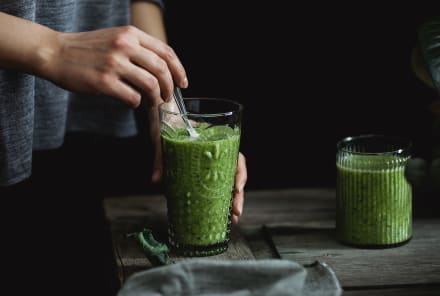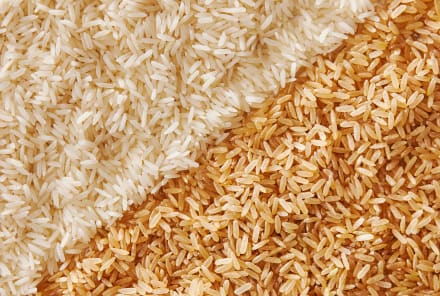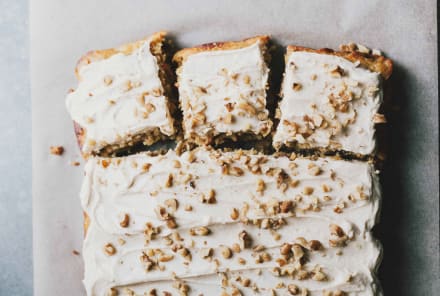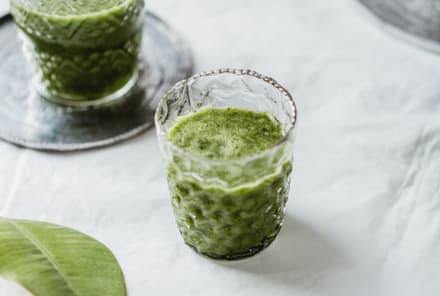Advertisement
Is The $10 Billion Beyond Burger Good For You & The Planet?


It seems we can't go a day without hearing something about Beyond Meat's Beyond Burger or Impossible's Impossible Burger—the two big meatless "meat" products taking the plant-based protein scene by storm. Right now, you can find a variety of Beyond Meat products in grocery stores, while the Impossible Burger is found solely at restaurants. And if recent news is any indicator, these alterna-meats aren't going anywhere soon.
In April, Burger King announced the launch of the Impossible Whopper, which will be available nationally by the end of 2019—and reports show it's already boosting sales at the fast food giant. In May, Beyond Meat went public, and since then, its stock has soared, giving the company a market capitalization of over $10 billion, as of July 10, 2019. It also recently announced the launch of its new Beyond Beef product, meant to taste, look, and cook up just like traditional ground beef. So, all in all, business is good.
Unlike traditional veggie burgers, though, which often cater to the vegetarian and vegan crowd, the plant-based burgers from these companies are meant to taste like meat, appeal to meat-eating customers, and (ideally) replace some of their meat purchases. In fact, both companies believe that people (and the planet) would be much better off if we removed animals from the food production equation entirely—a point that's drawn some controversy.
As Impossible says in its mission: "Animal agriculture occupies almost half the land on earth, consumes a quarter of our freshwater and destroys our ecosystems. So we're doing something about it: we're making meat using plants, so that we never have to use animals again." Beyond Meat's mission is similar but also emphasizes the benefit these products could have on human health: "By shifting from animal to plant-based meat we are creating one savory solution that solves four growing issues attributed to livestock production: human health, climate change, constraints on natural resources, and animal welfare." Beyond Meat's website lists statistics citing that the consumption of animal-based meats is associated with a 16% increased risk of cancer and a 21% increased risk of heart disease.
But the growing popularity—and purported health and environmental claims—of these products do not have everyone pleased. Recently, Kettle & Fire and Perfect Keto co-founder Justin Mares unleashed an epic tweetstorm highlighting his concerns about these "highly processed food products," as he calls them—and it raised some good points.
In regards to the Beyond Burger, Mares tweeted, "You're effectively getting a giant dose of canola oil and isolated pea protein. My main concern here is the heavy concentration of canola oil, as vegetable oils are terrible for you." As for the Impossible Burger, "their most controversial ingredient is Soy Leghemoglobin. To make this ingredient, Impossible genetically engineers a yeast bacterium to produce a protein (soy leghemoglobin) that gives their burger more of a 'meaty' taste. The jury is out on how safe this ingredient is...but I'd consider myself skeptical."
Overall, his bigger concern with both is that, at minimum, "they are HIGHLY processed products with lots of stuff that doesn't lead to healthier humans: vegetable oils, soy, protein isolates, additives, all non-organic. They are not real foods."
Because Mares has founded companies that sell animal-based food products (Kettle & Fire makes bone broth with bones from grass-fed cows and other sustainably raised animals), some say his opinion can't be considered truly impartial. But what he says does raise important questions, and his concerns about certain ingredients (like canola oil) sound a lot like concerns we've heard in the past from many prominent functional nutrition experts.
So, what's a health- and eco-conscious consumer to think? Here, we talk to a variety of health and nutrition experts to determine if either of these burgers are remotely healthy—and even if they're not, if there's still a meaningful role for them to play in the future of our food system.
First, let's take a look at what's inside these vegan burgers.
Before highlighting what a bunch of experts think about the nutritional value (or lack thereof) of these burgers, it's helpful to see what's actually in them. Important to note, the Beyond Burger is Non-GMO Project Verified (i.e., free of genetically modified ingredients), while the Impossible Burger is not. Here are the most up-to-date ingredient lists for each:
Beyond Burger ingredients: Water, Pea Protein Isolate, Expeller-Pressed Canola Oil, Refined Coconut Oil, Rice Protein, Natural Flavors, Cocoa Butter, Mung Bean Protein, Methylcellulose, Potato Starch, Apple Extract, Salt, Potassium Chloride, Vinegar, Lemon Juice Concentrate, Sunflower Lecithin, Pomegranate Fruit Powder, Beet Juice Extract (for color)
Impossible Burger ingredients: Water, Soy Protein Concentrate, Coconut Oil, Sunflower Oil, Natural Flavors, 2% or less of: Potato Protein, Methylcellulose, Yeast Extract, Cultured Dextrose, Food Starch Modified, Soy Leghemoglobin, Salt, Soy Protein Isolate, Mixed Tocopherols (Vitamin E), Zinc Gluconate, Thiamine Hydrochloride (Vitamin B1), Sodium Ascorbate (Vitamin C), Niacin, Pyridoxine Hydrochloride (Vitamin B6), Riboflavin (Vitamin B2), Vitamin B12
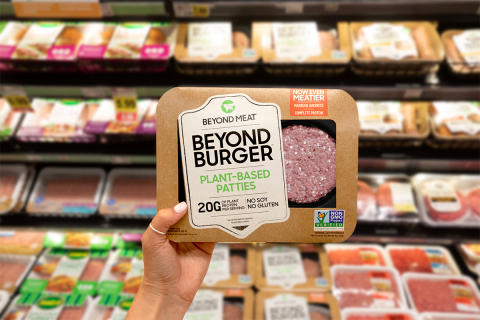
Based on the ingredients, can we call the Beyond Burger or the Impossible Burger healthy?
The answers we got from experts were all over the map. The general consensus: Healthy may be a strong word, but they're probably nothing to freak out over.
"Between Beyond Burger and the Impossible Burger, it seems that the Beyond Burger has less problematic ingredients, although neither of them is ideal for the health-conscious consumer," says Vincent Pedre, M.D., integrative physician and gut health expert. In the Beyond Burger, Pedre has the biggest problem with canola oil, which is still an inflammatory omega-6 fat even if it is non-GMO and expeller-pressed. In the Impossible Burger, he expresses concern about the various soy-derived ingredients (soy protein concentrate, soy protein isolate, soy leghemoglobin), which are most likely made from genetically modified soy that's treated heavily with pesticides. Both burgers also contain natural flavors, which, he says, "are naturally derived, but the final product may be highly processed and contain chemical additives."
When I spoke with registered dietitian Abby Cannon, R.D., who often promotes plant-based eating and living an eco-friendly lifestyle, she shared similar concerns about the ingredients in these burgers (and, like Pedre, she thinks Beyond Burger's ingredients are a bit better than Impossible's). This honestly surprised me, given her background. When I asked her if either of these burgers were remotely healthy, she replied with an emphatic "No, I'm not a fan!"
"I think so often people are like 'oh it's vegan, it's plant-based, it's healthy,' and that's not necessarily the case," says Cannon. "We really want to be thinking about eating real whole foods. I would always prefer you eat peas as opposed to pea protein isolate—which needs to be significantly processed to get into that form. In promoting plant-based eating, we're still not doing enough to promote eating real whole foods in their natural form."
Other experts, however, aren't nearly as worried. "I'm not concerned at all with the ingredients of either of these products (Beyond Meat and Impossible). These seem like a good choice that easily mimic the meat eaters that may surround you," says Rachele Pojednic, Ph.D., assistant professor of nutrition at Simmons University. "You'd likely want to be more careful about what you pair with it—french fries, chips, and soda are likely going to be more of the problem when you're out having burgers. Overall, they're not that different from the ingredients that you may see in many protein bars on the market that people love."
But are these burgers healthier than beef?
Here's where our experts' opinions really start to vary—and, after posing this question, it became clear to me that the answer is much more nuanced than a simple yes or no.
Let's start on the pro-meat end of the spectrum: If given the option between a Beyond or Impossible Burger and a beef burger, Diana Rodgers, R.D., a real-food dietitian who lives on a working organic farm in Massachusetts, would choose any type of beef (but ideally grass-fed, grass-finished beef) every time. "I'm a huge believer in eating whole, real foods and avoiding ultra-processed foods," she says. "Beyond Meat and Impossible burgers fit the definition of ultra-processed and simply do not have the same micronutrients available in real beef like high-quality iron, B12, zinc, and others."
Rodgers, who is currently working on a documentary film and companion book called Sacred Cow—which makes the nutritional, environmental, and ethical case for better meat—also has a big problem with the way Beyond Meat insinuates that its products are healthier and less likely to cause heart disease and cancer than real beef.
According to Rodgers, "There are several things wrong with this. Their citation references processed meats. Real burgers are not in this category, they're considered fresh red meat. There are zero studies showing that red meat causes heart disease or cancer. Some studies show associations between people who eat meat and people who get cancer and heart disease, but the actual cause has not been proved. Think about your typical vegetarian compared to a typical meat eater in America. Typical vegetarians are more likely to do other healthy things like drink and smoke less, work out more, and generally take care of themselves better. When all of these lifestyle factors are accounted for, there's no proof1 that eliminating meat is beneficial for your health." (These imperfect observational nutrition studies are the same reason we have such a hard time coming to a conclusion on eggs.)
Somewhere in the middle: A few other experts I chatted with said they'd also recommend eating a beef burger over an Impossible or Beyond Burger—but only if it was a grass-fed, grass-finished burger (i.e., one made with meat from cows who lived their entire lives on pasture eating grass and forage), which tend to be a bit leaner2 and have a somewhat healthier fatty acid profile with a higher concentration of omega-3s3. And if that's not an option, well, then some of them said they might consider one of these plant-based meatless meat options—or opt for something else entirely.
"Even though I personally eat plant-based, I feel totally fine saying I'd prefer someone eat a grass-fed burger over one of these, or that they eat something else altogether," says Cannon, adding that people should still probably limit their consumption of grass-fed beef burgers to once or twice a week. "But if grass-fed beef isn't an option and you have to choose between a conventional burger and a Beyond or Impossible Burger—ugh—I'd have to say a Beyond or Impossible Burger. From a health perspective, the antibiotics that [conventional] cattle are receiving and the conditions they're being raised in don't make for high-quality meat. So it's kind of like the lesser of two evils." If Cannon had her pick of options, however, she'd whip up a homemade veggie burger, or choose a store-bought option featuring real whole foods, like beans and whole grains, instead of protein isolates
Pedre says his ideal burger would be made from grass-fed bison, which is less fatty than a beef burger, but that he would also be open to a grass-fed, grass-finished beef burger. And if he had to choose between a conventional beef burger and a Beyond or Impossible Burger? "I would choose neither," he says. "I can't bring myself to eat a processed food like that because I care too much about my cardiovascular health, which would be compromised."
And while renowned functional and integrative medicine doctor Frank Lipman, M.D., didn't have a lot to say, he did tell me this after reviewing the ingredient lists of these meatless burgers: "Not that I eat burgers too often...but give me a grass-fed, grass-finished burger any day. Eat whole foods as close to nature as possible."
On the opposite end of the spectrum, though, some experts think any meat consumption is just too risky for cardiovascular health, and these alternative burgers could be a great way to make scaling back on meat easier for omnivores.
"[Beef] burgers have been shown to raise4 all subtypes of LDL cholesterol (along with white meat4) and impair artery function within hours likely due to the release of bacterial endotoxin from both dead bacteria in the meat and the high saturated fat content," says cardiologist and vegan Joel Kahn, M.D. "These outcomes have not been studied with the Beyond Meat burger. However, a Beyond Meat burger, on a 100% whole grain bun with a slice of tomato, onion, and lettuce, covered with turmeric-rich mustard and lycopene-rich organic ketchup, topped with a pickle to the side is the smart consumer's choice.”
Other experts say we just don't know, and that there's no definitive evidence to say if either the Beyond Burger or the Impossible Burger is, in fact, healthier than beef.
"If you look at the three reasons why these things might be a net positive to society—one is the environment, one is the ethical argument, one is the nutrition—I still say the nutrition is the weakest," says Ethan Weiss, M.D., cardiologist and associate professor at U.C.-San Francisco's Cardiovascular Research Institute. "Both the Beyond Burger and Impossible Burger are similar to a typical ground beef burger in terms of saturated fat content. And then from there, I think what you're doing is trading all these hypothetical benefits or harms in either product, and it's basically impossible to make a health claim."
Weiss says he'd have no problem eating them, though, adding that he's tried both options and far prefers the flavor of the Impossible Burger. "But would I eat them every day? No," he says. "I don't think I'd eat anything every day."
So maybe they're not especially healthy, but are they at least better for the environment?
Short answer: It's really freakin' complicated—and again, it probably depends on the type of meat you're comparing them to.
Choosing an alternative meat burger like Impossible or Beyond may have some beneficial environmental implications, especially in comparison to conventional beef. Beyond Meat commissioned a life cycle assessment (LCA) study with the Center for Sustainable Systems at the University of Michigan and found that the Beyond Burger generates 90% less greenhouse gas emissions, requires 46% less energy, and has 99% less impact on water scarcity and 93% less impact on land use than a quarter pound of conventional U.S. beef. Similarly, in another LCA study, the Impossible Burger was found to use 96% less land, 87% less water, 92% less aquatic pollutants, and create 89% less greenhouse gas emissions than conventional beef.
But some of our experts caution that they may not be quite the eco and ethical slam dunk they're being presented as, and that well-raised farm animals (i.e., not the ones raised on factory farms) can actually play a very valuable role in countering the effects of climate change.
"The meat industry is one of the worst offenders for greenhouse gas emissions. It's estimated that between 14.5 and 18% of human-induced greenhouse gas emissions are coming from livestock," says Cannon. "But if these [plant-based meats] are going to be a huge industry and there's a lot of monocropping—you know, growing lots of one type of crop with a lot of chemicals—it's kind of hard to say how much better that will actually be." (The Beyond study did concede that the production of the burger's dominant ingredients—pea protein, canola oil, coconut oil—represent important contributions to greenhouse gas emissions, energy use, and land use.)
For Cannon, a Beyond Burger or Impossible Burger would be a smarter pick than a conventional beef burger from an environmental perspective—however, a grass-fed, grass-finished burger would be even better. "I do a lot of research into the environment, and regenerative agriculture [a category under which grass-fed, grass-finished cattle can be lumped in] could help solve a lot of the problems we're facing in terms of climate change—and it relies on having healthy animals grazing on the farm. It's part of a healthy overall ecosystem."
"I often wonder how much money and technology has gone into creating these burgers," says Cannon. "I would much rather that money go into regenerative agriculture or education toward helping people learn why they should be eating high-quality whole foods—to me, that would make more sense than trying to convince people to eat a burger that tastes like a burger."
Rodgers strongly agrees that producing more high-quality grass-fed meat via regenerative agriculture is a smarter way to help rehab our environment and food system, and adds some valuable insight into how some of the environmental stats against meat (and in favor of plant-based alternatives) tend to get skewed.
"According to the Food and Agriculture Organization of the United Nations (FAO), more than 60% of our agricultural lands are only suitable for pasture (grazing animals) and not for crop production. So to blame cattle, as Beyond Meat does, for 'using up' valuable land that we could be growing food on is unfair," says Rodgers. "In fact, if we didn't have grazing animals like cattle on this land, it would deteriorate. Regenerative agricultural practices, which require cattle and other grazing animals, increase biodiversity and improve the water-holding capacity of the soil, making rainfall more effective and preventing runoff. Plus, cattle can convert food we can't eat (grass and forage) on land we can't crop into nutrient-dense food."
Timely enough, a recent LCA study conducted at White Oaks Pastures—a 3,000-acre farm following regenerative grazing practices with their cattle and other livestock, and a Savory Institute Hub—found that the farm produced a net "carbon sink," after taking a full account of all greenhouse gases in and out of the farming operation. Meaning, the farm actually absorbs more carbon than it releases into the atmosphere as carbon dioxide. Neither Beyond Meat nor Impossible can say the same for their own operations, which are both net carbon emitters. The study was performed by Quantis, the same third-party firm that conducted the LCA study for Impossible Burger.
For all of these reasons, Rodgers says that Impossible Foods' goal of ending all animal agriculture is extremely problematic and fails to recognize the important ecosystem function of ruminant animals like cows. "This goal also implies that the farming required to produce these fake meats is somehow beneficial to animals," she says, "when in reality, none of these products are made from organic plants, and many animals—including birds, pollinators, and fish—are killed through the spraying of chemicals and the clearing of fields needed to grow these monocrops."
Let's quickly recap...
Now, that is a lot of information to digest. So let's summarize what we know:
- Neither the Beyond Burger nor the Impossible Burger has a super-impressive ingredient list, with some experts finding Impossible to be a bit more problematic. But they're not exactly terrible for you either. Think of them like really processed protein bars with some extra fat.
- From a nutritional perspective, Beyond and Impossible may be better in some ways than a conventional beef burger, but a grass-fed, grass-finished beef burger or a plant-based burger featuring whole-food ingredients like beans and grains is likely your best bet.
- From an environmental perspective, Beyond and Impossible are almost certainly better than conventional factory-farmed beef, but their ingredients are still significant contributors to greenhouse gas emissions, energy use, and land use. Grass-fed, grass-finished burgers made from sustainably raised cattle that are part of a regenerative agriculture system are a better choice, as ruminant animals actually play a crucial role in our ecosystem.
- From an ethical perspective, Beyond and Impossible burgers are certainly better than beef if you don't want to contribute to the death of cows, but growing the conventional crops used to make them still negatively affects other animals to some extent.
What meaningful role can these "meats" potentially play in our food system?
First and foremost, it should be emphasized that you can eat whatever you want, whenever you want (there's this little concept called "food freedom," coined by Melissa Hartwig Urban, that we really value here at mbg). And it's the belief of many nutrition experts that your health will not be defined by any one individual food you eat but rather the overall quality of your diet. So even if these burgers are not perfect, we do not need to dismiss them entirely. There's something to be said for eating a food simply because you enjoy it—and if you enjoy the taste of meat but do not want to actually be eating meat (for whatever reason), there's nothing wrong with having one of these burgers from time to time.
In certain situations, they may also play a valuable role for certain people. While these burgers may not make the most sense as your go-to, cook-at-home protein, there is value of them as an alternative to conventional beef burgers in fast-food and other restaurants. Chances are that Burger King is never going to offer a grass-fed, grass-finished Whopper, and these burgers at least give you an option to have a burger experience without putting your dollars toward factory farming. Just don't fool yourself into thinking they're that much (or any) healthier than beef. And if you eat one, focus on improving the quality of your condiments and sides.
Additionally, Cannon says they might be good "transition" foods. "I think the place for these foods is in that transition period when someone is trying to adopt a plant-based diet but isn't quite open to something like a black bean quinoa burger yet," she says. "Maybe a Beyond or Impossible burger makes someone more open to trying a more whole-food, plant-based burger that's not as processed down the road."
So should you incorporate Beyond or Impossible burgers into your diet? Every once in a while, sure. They're innovative, but there's certainly room for improvement (let's hope for an organic option that swaps out canola oil for avocado oil!), and a mission to eliminate all animal agriculture is inherently flawed. But when you really want a burger, it's the better choice to opt for a nice grass-fed, grass-finished burger—especially considering that in many grocery stores grass-fed beef is still pound-for-pound less expensive.
Watch Next
Enjoy some of our favorite clips from classes
Enjoy some of our favorite clips from classes
What Is Meditation?
Mindfulness/Spirituality | Light Watkins
Box Breathing
Mindfulness/Spirituality | Gwen Dittmar
What Breathwork Can Address
Mindfulness/Spirituality | Gwen Dittmar
The 8 Limbs of Yoga - What is Asana?
Yoga | Caley Alyssa
Two Standing Postures to Open Up Tight Hips
Yoga | Caley Alyssa
How Plants Can Optimize Athletic Performance
Nutrition | Rich Roll
What to Eat Before a Workout
Nutrition | Rich Roll
How Ayurveda Helps Us Navigate Modern Life
Nutrition | Sahara Rose
Messages About Love & Relationships
Love & Relationships | Esther Perel
Love Languages
Love & Relationships | Esther Perel

